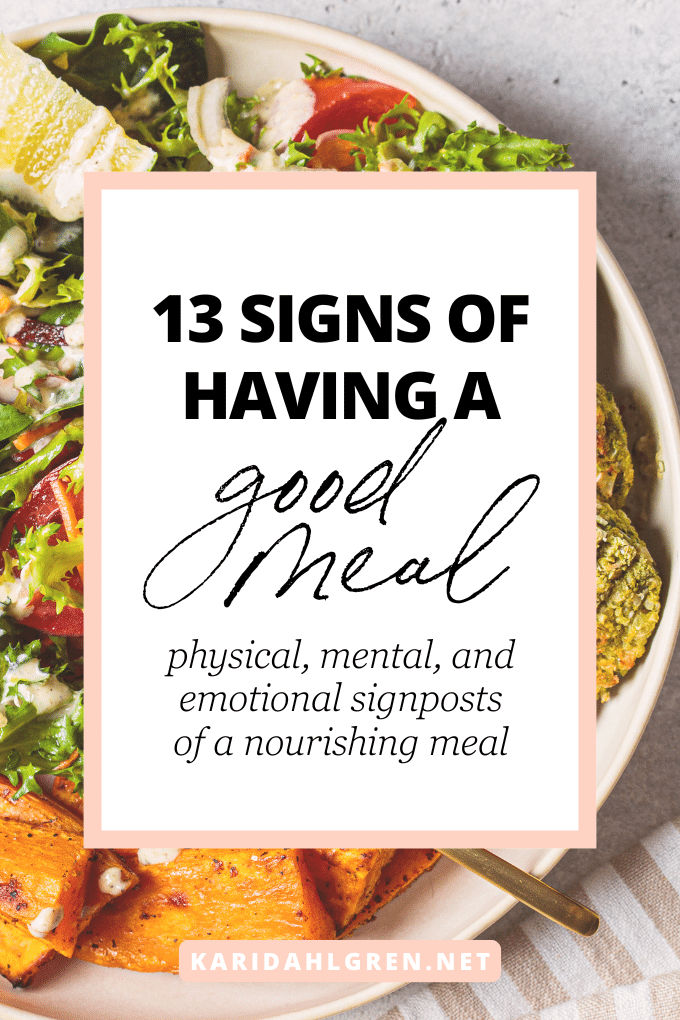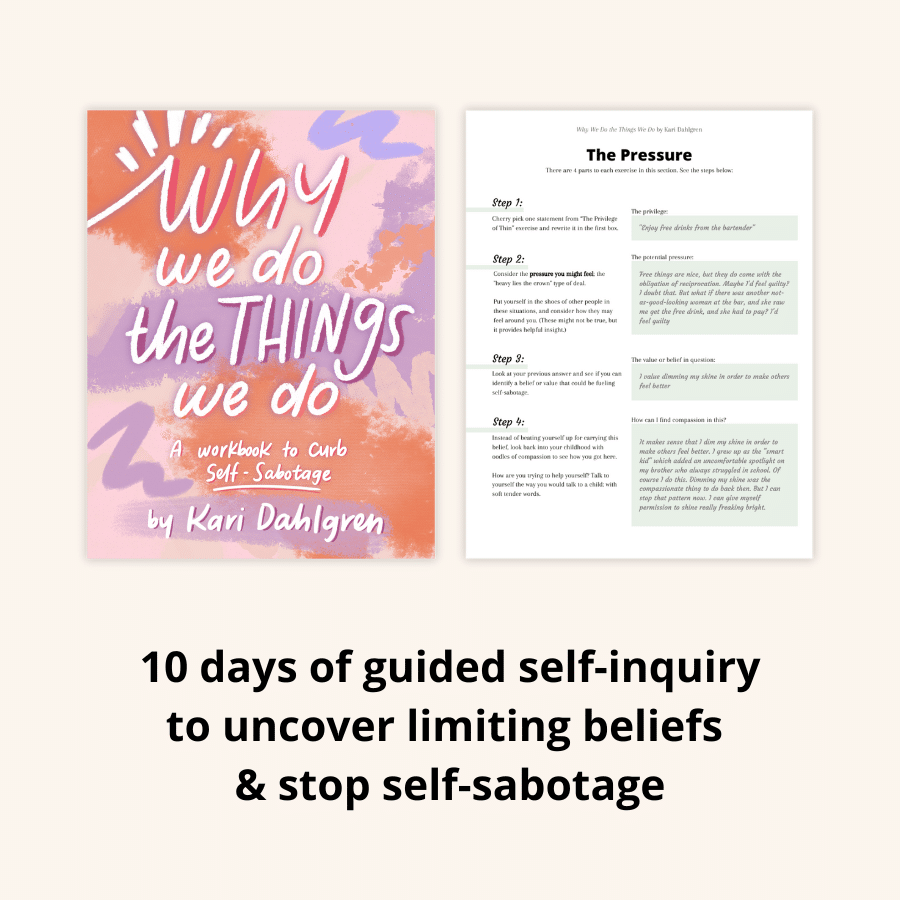
Recognizing the signs of a good meal goes deeper than just knowing your food was tasty—it’s about understanding how your body and mind respond afterward. Whether it’s feeling energized, clear-minded, or just comfortably full, these signposts can guide you toward a more intuitive and balanced approach to eating.
In this article, we’re going to explore the physical, mental, emotional, and even energetic signs of enjoying a good meal. By knowing what to look for, I hope you can build a stronger relationship with food that nourishes your mind, body, and spirit.
Why Should We Care About Good Meals?
Many of us struggle to identify a truly nourishing and satisfying meal, and diet culture is largely to blame. We’ve been conditioned to believe that eating well means adhering to strict, often unrealistic standards, like avoiding all processed foods and cutting out sugar entirely.
These stringent ideals can leave us feeling deprived, setting off a cycle of deprivation, restriction, and “caving in” to cravings later on. This vicious cycle, also known as the restrict-binge cycle, reinforces a negative relationships with food. That’s why it’s crucial to learn how to recognize a meal that genuinely satisfies you—not based on rigid rules, but on how it makes you feel physically, mentally, and emotionally.
After all, satisfaction is deeply personal, and what works for one person might not work for another. By understanding this, you can break free from the one-size-fits-all approach of diet culture and cultivate a more balanced and fulfilling relationship with food.
Also, it’s worth noting that calling a meal ‘good’ can sometimes lead to the moralization of food, dividing what we eat into ‘good’ and ‘bad’ categories. In this article, ‘good’ is used in the everyday sense, where it refers to something that’s simply delightful. In this context, a good meal is nourishing, satisfying, and thoroughly enjoyable—without any moral judgment attached.
Physical Signs That You Had a Good Meal
Identifying the signs of a good meal can help you recognize how your body responds to the food that you eat, fostering a better relationship with food in the long run. When you know what to look for, you can better gauge whether a meal has provided the nourishment your body needs.
Here are some telltale signs that you had a good meal:
1. Sustained Energy Levels
One of the clearest signs that you’ve had a good meal is the steady energy it provides, keeping you fueled for at least several hours. Energy stability comes from balanced meals that contain carbohydrates, proteins, and healthy fats.
2. Digestive Comfort
One of the key signs that you’ve had a good meal is the feeling of lightness and ease in your body afterward, free from discomfort or bloating. This sense of digestive comfort is often the result of choosing easy-to-digest foods and enjoying balanced meals that your body can process smoothly.
When you listen to your body and avoid foods that you know don’t make you feel well—while focusing on overall well-being instead of restriction or judgment—you’re more likely to feel comfortable after eating, and that’s a sign of a good meal.
3. Absence of Overeating
A good meal typically leaves you feeling comfortably full. This means that you feel satisfied after eating you meal without the discomfort of being overly stuffed.
That said, occasional overeating does not mean that you had a “bad” meal. Instead, focus on the overall experience and how the meal contributes to your well-being, without judgment or guilt. Flexibility and self-compassion are key to fostering a healthy relationship with food.
4. Proper Hydration
When properly hydrated, you’ll feel comfortable, without the dry mouth or lingering thirst that can follow a meal lacking in fluids. A well-hydrated body is often an overlooked sign that you’ve had a good meal. However, it’s important to be mindful of how and why you hydrate.
According to a study published in European Eating Disorders Review, excessive fluid intake can be associated with disordered eating behaviors, where individuals may drink large amounts of water to suppress appetite or control their weight.[1] To avoid this harmful pattern, drink water when you’re thirsty, and avoid using fluids as a tool for appetite suppression. This ensures that your hydration supports your overall well-being.
Emotional and Mental Signs That You Had a Good Meal
Food is not just about physical nourishment—it also plays a key role in your emotional and mental well-being. Understanding how a meal leaves you feeling emotionally content and mentally at ease can help you recognize when you’ve truly satisfied your body’s needs.
Here are additional signs that reflect the emotional and mental signs of a good meal:
5. Contentment and Relaxation
One surefire sign of a good meal is feeling content, which is distinctly different from feeling full. Fullness is a physical state that your body reaches when hormones like leptin, one of the fullness hormones, signal that you’ve had enough to eat.
Contentment after a meal is an emotional and mental state that goes beyond mere physical fullness. It’s about feeling genuinely satisfied and at peace with your meal choices, knowing that you’ve nourished your body in a way that aligns with your needs and desires. When you’ve had a good meal and feel content, you’re free from the nagging urge to keep eating in search of something that was missing.
6. Lack of Food Cravings
A key sign of a good meal is the reduction or absence of food cravings afterward, particularly for unhealthy snacks or sugary treats. When your meal includes a balance of nutrients and the foods you genuinely want, it satisfies both your body’s physical needs and your psychological desires, making it less likely that you’ll feel the urge to reach for something else shortly after eating.
Research supports this idea, showing that when you deprive yourself of specific foods, it can actually increase cravings for those very foods.[2] By allowing yourself to enjoy the foods you crave as part of a good meal, you’re more likely to feel content and less likely to seek out additional snacks, creating a more satisfying and balanced eating experience.
Struggle with cravings? Reveal your hidden strength around food and how to leverage it by taking my eating psychology strengths quiz.
7. No More Lingering Thoughts About Food
A good meal not only nourishes your body but also supports a positive mood and clear mind. Many people find that food is always on their mind, and when you eat the foods you truly want, and to a level of comfortable fullness, you help decrease this preoccupation with food. A clear sign of a good meal is when you can move on with your day without lingering thoughts about what you just ate or what you might eat next.
8. Connection with Food and Body
A sign of a good meal is feeling a strong connection with your food and your body. When you take the time to enjoy your meal mindfully—savoring each bite and paying attention to how it makes you feel—you deepen your awareness of your body’s needs and responses.
This mindfulness, coupled with a sense of gratitude for the food in front of you, helps you build a better relationship with eating.[3] When you finish your meal feeling not only nourished but also in tune with your body, that’s a clear sign that you’ve had a truly good meal.
9. Positive Memories
A good meal often leaves you with lasting positive memories, which are tied to the multisensory experiences during the meal—the aroma, flavors, textures, and even the sounds around you. Engaging all your senses creates a vivid impression that enhances satisfaction and influences future food choices.
According to a study published in the American Journal of Clinical Nutrition, enhancing your memory of a meal can help reduce overeating later on, as those memories play a crucial role in regulating your appetite.[4] By looking out for these signs of a good meal, you not only enhance the eating experience, but foster overall well-being too.
Social and Environmental Signs That You Had a Good Meal
Not all signs of a good meal have to do with the food on your plate. The energy around you also plays a role in creating a fulfilling eating experience.
10. Enjoyable Social Interaction
One of the signs of a good meal is the social interaction that accompanies it. Social connections during meals play a crucial role in meal satisfaction, as they add an emotional and psychological layer of fulfillment that goes beyond the food itself.
According to a study published in PLoS One, social experiences are a key dimension of eating pleasure, and integrating them can make eating more enjoyable and potentially healthier.[5]
11. Good Environment
A good environment can significantly influence how much you enjoy your meal. A pleasant, relaxing setting can help you focus on your food and immerse yourself in the sensory experience, making the meal more satisfying. Whether you’re dining with others or enjoying a quiet solo meal, if you are fond of your environment, it’s a sign of a good eating experience.
Long-Term Indicators of Consistently Good Meals
Many signs of a good meal focus on the short-term, so let’s broaden our view to recognize some of the long-term indicators of prioritizing nourishing meals.
12. Improved Health Markers
A good meal isn’t just about immediate satisfaction; it’s also about contributing to your long-term health. But instead of focusing on weight as a health metric, consider more important indicators like consistent energy throughout the day, stable blood sugar levels, and healthy cholesterol and blood pressure readings. These markers reflect the benefits of consistently nourishing your body with balanced, satisfying meals over the long term.
13. Flexible Eating Habits
Flexible eating habits acknowledge that life doesn’t always allow for perfectly balanced meals, and that’s okay. The goal is to focus on flexibility rather than perfectionism. Sometimes, you might need to grab a quick bite due to limited time, money, or other constraints, and that’s still a valid part of a healthy eating pattern.
By embracing this flexibility, you can reduce the pressure to make every meal “perfect” and instead listen to your body’s needs in the moment. This approach recognizes that a good meal is one that serves you well, whether it’s carefully planned or a quick, necessary choice.
Embrace the Journey to Nourishment
Finding joy in your meals is about more than just satisfying hunger; it’s about listening to your body and honoring what it truly needs. As you explore what makes a meal truly fulfilling—physically, mentally, and emotionally—remember that there’s no one-size-fits-all answer.
It’s about tuning into your own experience and recognizing that sometimes, the best meals are the ones that leave you feeling balanced and content, rather than perfectly aligned with strict standards. Let go of the pressure to get it “right” every time, and instead, focus on what makes you feel good, nourished, and at peace.



